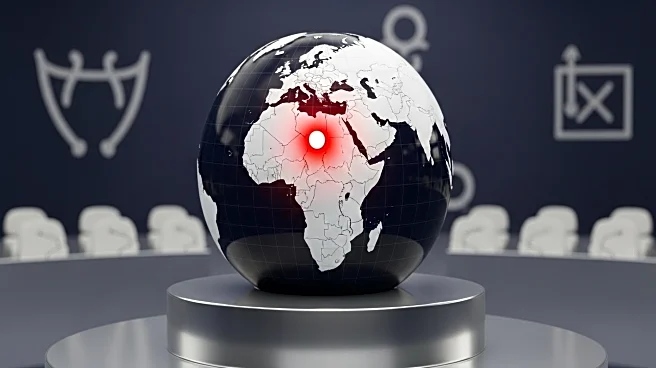What's Happening?
Russian Foreign Minister Sergey Lavrov addressed the United Nations General Assembly, asserting that Russia does not intend to attack Europe but will respond decisively to any aggression. This statement comes amid heightened tensions following unauthorized flights into NATO airspace, which NATO attributes to Russia. These incidents have raised concerns across Europe, particularly after NATO jets downed drones over Poland and Russian fighter jets reportedly entered Estonian airspace. Lavrov denied these allegations, suggesting that Ukrainian signal-jamming caused the drones to veer off course. He emphasized that Russia faces threats and reiterated that any aggression against Russia would be met with a decisive response. Lavrov's speech occurred three years into the ongoing conflict in Ukraine, which has been widely condemned by the international community.
Why It's Important?
The situation underscores the fragile state of relations between Russia and NATO, with potential implications for European security and diplomatic relations. NATO's warning to Russia about defending its airspace highlights the alliance's readiness to protect its members, which could lead to increased military presence and readiness in the region. The ongoing conflict in Ukraine remains a significant geopolitical issue, affecting international diplomacy and security strategies. Lavrov's comments suggest a willingness to engage in dialogue with the United States, which could influence future diplomatic efforts to resolve the Ukraine crisis. The broader implications include potential shifts in alliances and strategies among European nations and NATO members, as they navigate the complex dynamics of Russian-European relations.
What's Next?
NATO is likely to continue monitoring airspace violations closely and may increase its military presence in affected regions to deter further incidents. Diplomatic efforts between Russia and the United States may evolve, potentially impacting the approach to resolving the Ukraine conflict. European nations may reassess their security strategies and alliances in response to these developments. The international community will likely continue to advocate for a resolution to the Ukraine crisis, with ongoing discussions at diplomatic forums such as the United Nations.
Beyond the Headlines
The incidents highlight the ongoing struggle for influence and security in Eastern Europe, with NATO's expansion eastward being a point of contention for Russia. The situation raises questions about the balance of power in the region and the role of international organizations in maintaining peace and security. The broader geopolitical landscape may see shifts as countries reassess their positions and alliances in response to these tensions. The ethical and legal dimensions of airspace violations and military responses may also be scrutinized, influencing future international norms and agreements.










